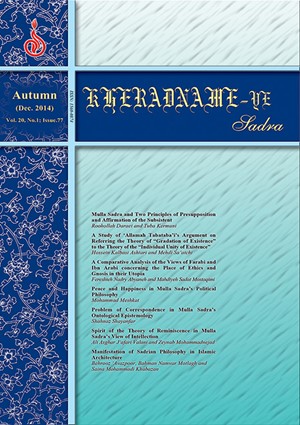Spirit of the Theory of Reminiscence in Mulla Sadra’s View of Intellection
Subject Areas :
1 - دانشگاه شهید مطهری
Keywords: Mulla Sadra Plato pre-eternity of the soul reminiscence intellection contemplation from a distance ,
Abstract :
In his explanation of perception, especially intellectual perception, based on his own philosophical principles, such as the principality and gradation of existence, commensurability of existence with knowledge and the trans-substantial motion, Mulla Sadra follows an approach different from that of his predecessors. On the other hand, he considers Plato’s theory of the pre-eternity of the soul in line with his own view of the corporeal origination of the soul based on its creation in the world of separate beings. The reason is that this creation in the world of separate beings and immaterial intellects is not in a particular and imperfect form. Rather, in the arc of descent, the soul enjoys corporeal origination along with the body’s trans-substantial motion and returns to the world of intellects in the arc of ascent. This ontological process is the same as an epistemological one. Accordingly, the soul observes the world of intellect through intellectual perception; the same world in which it enjoyed a rational existence at the beginning of the arc of descent. Given the intertwinement of ontology and epistemology in Mulla Sadra’s philosophy, as the development of the human soul in the worlds of existence is followed by its ontological development, moving from each world to the next one is followed by the perfection of perception, from the sense and imaginal perception to the intellectual one. Regarding intellectual perceptions, unlike sense and imaginal perceptions, Mulla Sadra believes in the flow of intellectual concepts from immaterial intellects into the soul and the soul’s contemplating them from a distance. Therefore, although Mulla Sadra does not agree with Plato’s theory of reminiscence, his particular view of intellectual perception can be a kind of reminiscence and recollection. However, given the differences between the philosophical principles of Plato and Mulla Sadra, we cannot consider them to be completely compatible with each other.
افلاطون، دورة آثار افلاطون، ترجمة محمدحسن لطفي، تهران، خوارزمي، 1380.#
آملي، محمدتقي، درر الفوائد، قم، مصطفوي، بيتا.#
حسنزاده آملي، حسن، دروس اتحاد عاقل به معقول، تهران، حكمت، 1404ق.#
خـامنـهاي، سيـدمـحمـد، «روح افـلاطـونـي در فلـسفـة ملاصدرا»، خردنامة صدرا، شماره 15، بهار 1378.#
داوودي، عليمراد، «آراء يونانيان درباره جان و روان»، مجلة دانشكده ادبيات و علوم انساني، شماره 3و4، 1349.#
گاتري، افلاطون، ترجمة حسن فتحي، فكر روز، 1381.#
گوارديني، رومانو، مرگ سقراط، ترجمة محمدحسن لطفي، تهران، طرح نو،1382.#
مصباح يزدي، محمدتقي، شرح جلد هشتم الاسفار الاربعه، تحقيق و نگارش محمد سعيديمهر، قم، مؤسسة امام خميني، 1380.#
ملاصدرا، الحكمةالمتعاليه في الاسفار العقلية الاربعه، ج1: تصحيح، تحقيق و مقدمة غلامرضا اعواني، تهران، بنياد حكمت اسلامي صدرا، 1383.#
ملاصدرا، الحكمةالمتعاليه في الاسفار العقلية الاربعه، ج3: تصحيح، تحقيق و مقدمة مقصود محمدي، تهران، بنياد حكمت اسلامي صدرا، 1383.#
ملاصدرا، الحكمةالمتعاليه في الاسفار العقلية الاربعه، ج8: تصحيح، تحقيق و مقدمة علي اكبر رشاد، تهران، بنياد حكمت اسلامي صدرا، 1383.#
ملاصدرا، الحكمةالمتعاليه في الاسفار العقلية الاربعه، ج9: تصحيح، تحقيق و مقدمة رضا اكبريان، تهران، بنياد حكمت اسلامي صدرا، 1382.#
ملاصدرا، الشواهد الربوبيه في المناهج السلوكيه، تصحيح، تحقيق و مقدمة سيدمصطفي محقق داماد، تهران، بنياد حكمت صدرا، 1382.#
ملاصدرا، المبدا و المعاد، تصحيح، تحقيق و مقدمة محمد ذبيحي و جعفر شاهنظري، تهران، بنياد حكمت اسلامي صدرا، 1381.#
ملاصدرا، حشر الاشياء، تصحيح و تحقيق سعيد نظري توكلي، در مجموعه رسائل فلسفي، ج2، تهران، بنياد حكمت اسلامي صدرا، 1389.#
ملاصدرا، مفاتيح الغيب، تصحيح، تحقيق و مقدمة نجفقلي حبيبي، تهران، بنياد حكمت اسلامي صدرا، 1386.#
ملكيان، مصطفي، تاريخ فلسفة غرب، قم، پژوهشگاه حوزه و دانشگاه، 1379.#


